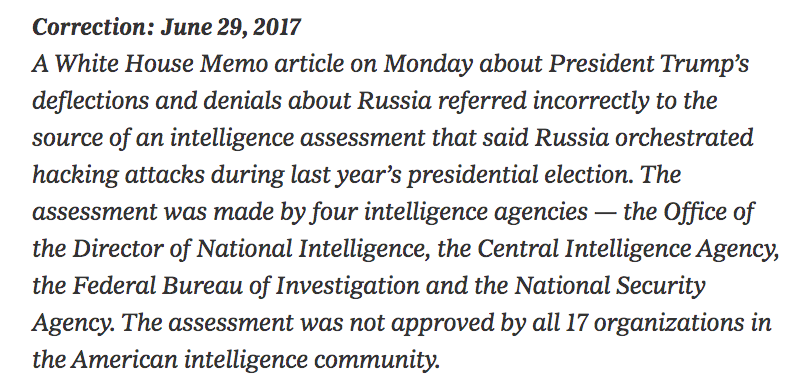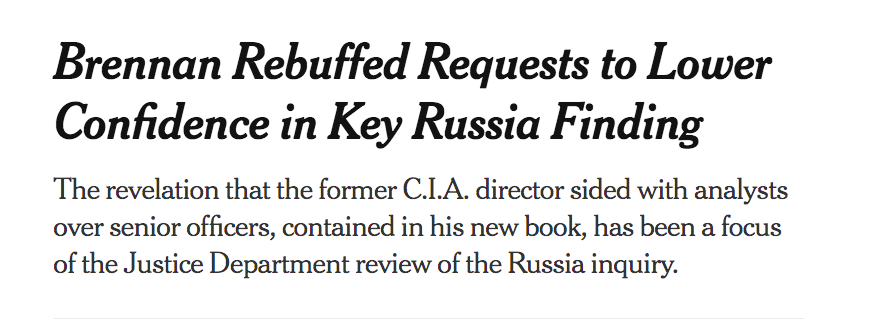
On March 16th, 2021, the Office of the Director of National Intelligence (ODNI) released a much-hyped, much-cited new report on “Foreign Threats to the 2020 Elections.” The key conclusion:
We assess that Russian President Putin authorized, and a range of Russian government organizations conducted, influence operations aimed at denigrating President Biden’s candidacy and the Democratic Party, supporting former President Trump, [and] undermining public confidence in the electoral process…
The report added that Ukrainian legislator Andrey Derkach, described as having “ties” to “Russia’s intelligence services,” and Konstantin Kilimnik, a “Russian influence agent” (whatever that means), used “prominent US persons” and “media conduits” to “launder their narratives” to American audiences. The “narratives” included “misleading or unsubstantiated allegations against President Biden” (note they didn’t use the word “false”). They added a small caveat at the end: “Judgments are not intended to imply that we have proof that shows something to be a fact.”
As Glenn Greenwald already pointed out, the “launder their narratives” passage was wolfed down by our intelligence services’ own “media conduits” here at home, and regurgitated as proof that the “Hunter Biden laptop story came from the Kremlin,” even though the report didn’t mention the laptop story at all. Exactly one prominent reporter, Chris Hayes, had the decency to admit this after advancing the claim initially.
With regard to the broader assessment: how many times are we going to do this? We’ve spent the last five years watching as anonymous officials make major Russia-related claims, only to have those evidence-free claims fizzle.
From the much-ballyhooed “changed RNC platform” story (Robert Mueller found no evidence the changed Republican platform was “undertaken at the behest of candidate Trump or Russia”), to the notion that Julian Assange was engaged in a conspiracy with the Russians (Mueller found no evidence for this either), to the story that Trump directed lawyer Michael Cohen to lie to Congress (“not accurate,” said Mueller), to wild stories about Paul Manafort meeting Assange in the Ecuadorian embassy, to a “bombshell” tale about Trump foreknowledge of Wikileaks releases that blew up in CNN’s face in spectacular fashion, reporters for years chased unsubstantiated claims instead of waiting to see what they were based upon.
The latest report’s chief conclusions are assessments about Derkach and Kilimnik, information that the whole world knew before this report was released. Even Rudy Giuliani, whose meeting with Derkach is supposedly the big scandal here, admitted there was a “50/50 chance” the guy was a Russian spy. Kilimnik meanwhile has now been characterized as having “ties” to Russian intelligence (Mueller), and as a “Russian intelligence officer” (Senate Intelligence Committee), and is now back to being a mere “influence agent.” If he is Russian intelligence, then John McCain’s International Republican Institute (where Kilimnik worked), as well as embassies in Kiev and Moscow (where Kilimnik regularly gave information, according to the New York Times), have a lot of explaining to do.
No matter what, the clear aim of this report is to cast certain stories about Joe or Hunter Biden as misinformation, when the evidence more likely shows that material like the Hunter Biden emails is real, just delivered from a disreputable source. That makes such stories just like, say, the Joe Biden-Petro Poroshenko tapes, which were also pushed by Derkach and reported on uncontroversially by major media outlets like the Washington Post, before it became fashionable to denounce those reporting such leaks as Russian “proxies” and “conduits.”
I never thought the Hunter Biden laptop story was anywhere near as big of a deal as the efforts by platforms like Facebook and Twitter to block access to it, which seemed a historic and dangerous precedent. This new effort to cast the reporting of “allegations against President Biden” as participation in a foreign intelligence campaign is nearly as ominous. Even worse is the degree to which press figures are devouring the message. Will any bother to point out the huge quantity of recent official takes on the Russia story that went pear-shaped?
What follows is a brief list of official claims that proved untrue. Initially published on March 18th, I’ll be updating this list regularly, placing the collapsed claims in roughly chronological order. It’ll take a while. So far:
Update 3/21/21 The “Back Channel to Russians” story, Yahoo! September 23, 2016. Yahoo! published a story by Michael Isikoff called, “US Officials Probe Ties Between Trump Adviser and Kremlin.” The piece identified Trump advisor Carter Page as a “possible back channel to the Russians,” and claimed he passed information from the Kremlin to figures higher up in the Trump food chain, like former campaign chair Paul Manafort.
The assertion that a Trump-connected figure was a Russian cutout who’d met with high-ranking Putin aides like Igor Divyekin and “high-ranking sanctioned individuals” like Rosneft chief Igor Sechin became the basis for countless future news stories. Yahoo! wrote up the Sechin allegation as follows (emphasis mine):
That meeting, if confirmed, is viewed as especially problematic by US officials because the Treasury Department in August 2014 named Sechin to a list of Russian officials and businessmen sanctioned over Russia’s “illegitimate and unlawful actions in the Ukraine.”
This proved incorrect on all fronts, with no evidence of any Page meetings with either man. In fact, the irregularities involved with the Isikoff story – particularly the use of information from British ex-spy Christopher Steele, identified as a “well-placed Western intelligence source” – became a bigger story than the alleged improper relationship between Page and Russians.
On the day the Isikoff story ran, the Hillary For America campaign released a statement about the “Bombshell Report On Trump Aide’s Chilling Ties to Kremlin.” They wrote:
It’s chilling to learn that US intelligence officials are conducting a probe into suspected meetings between Trump’s foreign policy adviser Carter Page and members of Putin’s inner circle while in Moscow.
The Clinton campaign, of course, did not disclose that it was the source of this story, meaning that all outlets quoting the press release about a “chilling” connection – see here, here, and here, for instance – had been fed disinformation.
An investigation by Justice Inspector General Michael Horowitz later concluded that the FBI “did not have information corroborating the specific allegations against Carter Page in Steele’s reporting” either at the time of the Isikoff piece or afterward, when it used the Steele allegations as a means to obtain authority to conduct secret surveillance of Page using the Foreign Intelligence Surveillance Act.
Update 3/21/21 “All 17 intelligence agencies,” October 19, 2016. Before the 2016 election, Hillary Clinton and others publicly stated that all 17 US intelligence agencies backed an assessment that cyberattacks in 2016 came from the “highest levels of the Kremlin.” That was later corrected in congressional testimony to four agencies. It was actually a hand-picked team from three agencies, and the chief conclusion from that group came mainly from CIA chief John Brennan, who in his own book, “Undaunted,” published in 2020, revealed that he had overlooked dissenting analysis from two members of the working group. Brennan said he believed “the quality of the sources justified the high confidence,” but the Times and other outlets reported that Brennan was basing much of his confidence on a single human source in Russia whose information was allowed to bypass the normal vetting process.
So a story that began as an assessment on Russian interference agreed upon by “all seventeen agencies,” became four agencies, then it was a hand-picked group from three agencies dominated by the CIA director, who overrode dissenting analysts within the group, likely because of confidence in one human source.
Read the entire article here.





